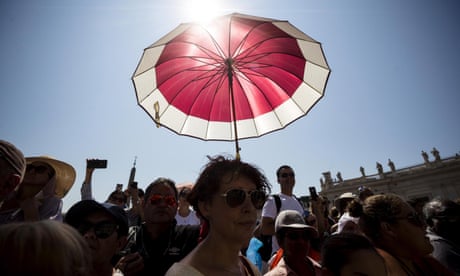Late-summer temperatures may prove unbearable for some visitors, posing threat to vital holiday industry

Los Caños de Meca, south of Spain, where temperatures exceeded 40C (104F) during a heatwave in July. Photograph: Emilio Morenatti/AP
Increased heat in Mediterranean countries is making the traditional summer beach holiday season in late July and August untenable for many northern Europeans. Tropical nights, where the temperature does not drop below 20C, are increasing and a recognised danger to health. The changing climate does have a plus side: beach and inland resorts that used to be too cold for comfort in spring and autumn are now a pleasant temperature.

Researchers in Spain concerned about the developing damage to their vital tourist industry are proposing that the peak season for holidays should be moved from August to June and September to accommodate the new reality of the climate. Later this century it will need to be shifted again.
For many older people these changes are already a reality. British, Scandinavian and German pensioners are finding off-season spring and autumn temperatures in Greece, Spain and Italy far more comfortable.
But for families tied to school terms, a large proportion of the current peak holiday crowd, it is a different matter. School holidays have been aligned with when the weather was supposed to be at its best wherever you lived in Europe, but this no longer applies. Unless schools change their traditional holidays the heat could mean Mediterranean countries are starved of summer visitors.
Since you’re here …
… we have a small favour to ask. Millions are flocking to the Guardian for open, independent, quality news every day, and readers in 180 countries, including Greece, now support us financially.
We believe everyone deserves access to information that’s grounded in science and truth, and analysis rooted in authority and integrity. That’s why we made a different choice: to keep our reporting open for all readers, regardless of where they live or what they can afford to pay. This means more people can be better informed, united, and inspired to take meaningful action.
In these perilous times, a truth-seeking global news organisation like the Guardian is essential. We have no shareholders or billionaire owner, meaning our journalism is free from commercial and political influence – this makes us different. When it’s never been more important, our independence allows us to fearlessly investigate, challenge and expose those in power.
In this unprecedented year of intersecting crises, we have done just that, with revealing journalism that had real-world impact: the inept handling of the Covid-19 crisis, the Black Lives Matter protests, and the tumultuous US election.
We have enhanced our reputation for urgent, powerful reporting on the climate emergency, and moved to practice what we preach, rejecting advertising from fossil fuel companies, divesting from oil and gas companies and setting a course to achieve net zero emissions by 2030.
If there were ever a time to join us, it is now. Your funding powers our journalism, it protects our independence, and ensures we can remain open for all. You can support us through these challenging economic times and enable real-world impact.
Every contribution, however big or small, makes a real difference for our future. Support the Guardian from as little as €1 – it only takes a minute. Thank you.




